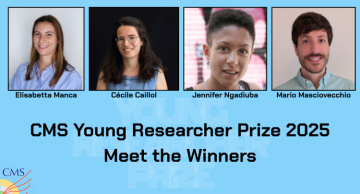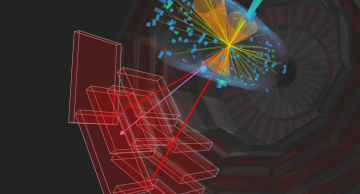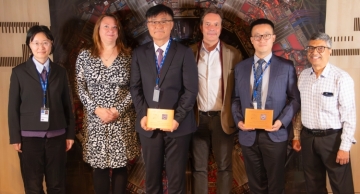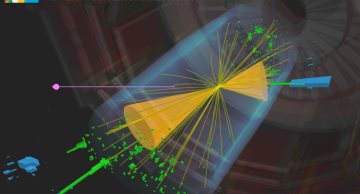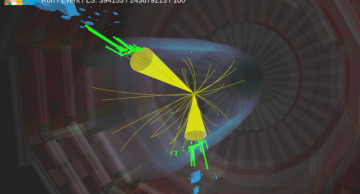The CMS experiment announces 8 new results for the Higgs 2025 conference.
For the Higgs 2025 conference, CMS publishes a number of new results.
The LHC Run 2 Legacy on Higgs boson pair production is obtained in an ATLAS+CMS combination (HIG-…
News
|
nstathak |
Collaboration
The CMS Collaboration announced the 2025 Young Researcher Prize winners during the September 2025 CMS Week. The winners are: Cécile Caillol, Elisabetta Manca, Mario Masciovecchio, Jennifer Ngadiuba!
This award recognises the contributions of truly…
|
maiqbal |
Physics
Using data collected from 2016 to 2023 and cutting-edge machine learning, CMS observes for the first time the creation of a top quark together with a W and a Z boson – a process so rare it occurs only once in a trillion proton-proton…
|
maiqbal |
Physics
In the first search of its kind at a particle collider, the CMS experiment looks for partially visible sprays of particles (jets), containing leptons and dark matter using physics-informed machine learning.
Can we shed light on dark matter?…
|
adelanno |
Physics
Five years after the first evidence that heavy metal hits the top quark, CMS now observes the clash of two titans with higher precision at unprecedented energy.
Using lead-lead collision data acquired in 2023 at the highest energy ever achieved by…
|
nstathak |
Collaboration
The CMS Collaboration is proud to announce the recipients of the 2024 Industry and Partner Awards, which recognise the vital contributions of our partners in advancing the experiment's capabilities. This year, we honour two collaborators for their…
|
maiqbal |
Physics
CMS scientists are on the hunt for a new, heavy particle that decays into a pair of Higgs bosons. Using the final state with two bottom quarks and two tau leptons, the search sets the most stringent limits to date in the mass range 1.4–4.5…
|
nstathak |
Collaboration
It's with great pride that the CMS Collaboration announces the winners of the 2024 CMS PhD Thesis Award. After a rigorous evaluation of a remarkable pool of 19 nominees, we are delighted to honour Congqiao Li, Christina Wenlu Wang, and Ho Fung Tsoi…
|
maiqbal |
Physics
The CMS experiment is utilising a novel technique called L1 Scouting, which allows it to record data from all collisions, without any selection, but in a reduced format. A first pioneer physics result using this data showcases the immense…
|
maiqbal |
Physics
CMS observes collective motion of particles in light-ion collisions, providing robust evidence of how initial nuclear geometry maps to final-state flow.
For the first time, the CMS experiment has measured how particles flow in collisions of…
|
maiqbal |
Physics
The CMS experiment has analyzed the first-ever neon-neon collisions, looking for signs of quark-gluon plasma. By comparing these results with data from oxygen-oxygen, xenon-xenon, and lead-lead collisions, physicists find an interesting…
|
maiqbal |
Physics
CMS scientists study the first-ever oxygen-oxygen collisions at the LHC, and observe signs of quarks and gluons losing energy when they travel through quark-gluon plasma – a state that existed just after the Big Bang.
When heavy ions such as…


